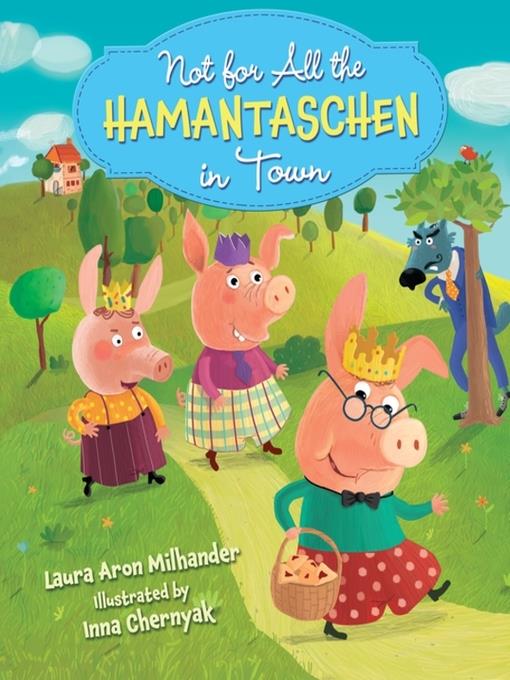
Not for All the Hamantaschen in Town
Purim
فرمت کتاب
audiobook
تاریخ انتشار
2017
Lexile Score
590
Reading Level
2-3
نویسنده
Book Buddy Digital Mediaشابک
9781512444919
کتاب های مرتبط
- اطلاعات
- نقد و بررسی
- دیدگاه کاربران
نقد و بررسی

November 30, 2015
A big, bad wolf crosses paths with three pigs named Rishon, Sheni, and Shlishi—which translate to “first,” “second,” and “third” for those who didn’t attend (or pay attention at) Hebrew School—at a Purim carnival. To his credit, the wolf isn’t in the market for pork chops: he only wants to buy some freshly baked hamantaschen. The wolf soon realizes that he will need a disguise if he’s going to visit the carnival, so he resolves to steal one of the homemade crowns that the pigs have made for their Purim costumes. This is a well-intentioned but over-stuffed and odd narrative: newcomer Milhander not only tries to tie together the elements and lessons of both the Purim story and “The Three Little Pigs” (the title is meant to riff on “Not by the hair of my chinny-chin-chin”), she also includes an anti-bullying message. “You may be big,” Shlishi tells the wolf, “but you don’t have to be bad.” Chernyak fares better: her candy colors, skewed perspectives, and wide-eyed characters give the scenes a sweetly goofy energy. Ages 3–8. (Feb.)■

July 1, 2016
PreS-Gr 1-The three little pigs prepare for the Jewish holiday of Purim by making crowns to wear to the carnival. Rishon (meaning first in Hebrew) quickly creates a paper crown and then spends the rest of the day playing in the mud. Sheni, the second little pig, takes a little more time using poster board, foil, and glue. Shlishi, the third, spends all day constructing his elaborate papier-mache crown and doesn't have time to play in the mud with his friends. The next day, the pigs attend the Purim carnival and encounter the big, bad wolf, who is desperate for a hamantaschen, the traditional three-cornered cookies made especially for the holiday. Afraid that no one will sell him one, he decides to steal a costume to disguise himself. "Little pig, little pig, give me your crown!" he growls at Rishon. "Not for all the hamantaschen in town!" is the pig's response. "Then I'll huff and I'll puff, and I'll blow your crown off!" The paper crown blows off the little pig's head but the wind blows it away before the wolf can grab it. An identical exchange occurs between the wolf and Sheni. Of course, when he tries his strategy on Shlishi, the sturdy crown doesn't budge. But Shlishi reasons with the wolf: "You may be big...but you don't have to be bad. Here-I'll lend you my crown." The wolf apologizes, the pigs forgive him, and everyone goes home happy. The cheery, textured digital illustrations depict an adorable cast of animal characters. Oddly, only the pigs, wolf, and lamb are named-the rest of the animals are referred to as children in the text. A recipe for hamantaschen is appended along with a simple explanation of Purim and a glossary of holiday terms. There is also an unfortunate error in the text: "Just then, a child dressed as Mordecai stepped forward.... He offered the wolf a black, three-cornered Haman hat." Mordecai, one of the heroes of the Purim story, does not wear the three-cornered hat characteristic of Haman, the villain. VERDICT Picture books about Purim aren't as prevalent as books for Hanukkah and Passover, so educators and libraries serving large Jewish populations may welcome this addition; however, it is likely an optional purchase for most.-Rachel Kamin, North Suburban Synagogue Beth El, Highland Park, IL
Copyright 2016 School Library Journal, LLC Used with permission.

























دیدگاه کاربران